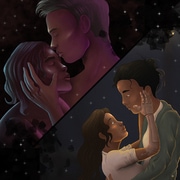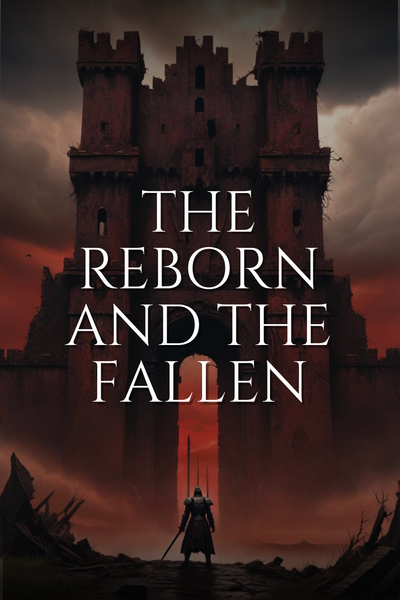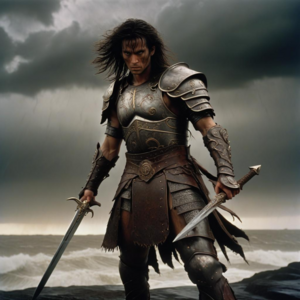In the moments following his fall, Kael found a brief respite from the onslaught. The enemy’s presence receded into the periphery, and in that fleeting calm, the weight of his existence pressed upon him like a funeral shroud. His thoughts turned inward, unearthing memories of distant loves and forgotten promises. There was a time when he had cherished a tender moment—a stolen glance beneath the moonlit sky, a whispered promise of a future unburdened by bloodshed. But those memories were now as ephemeral as mist, dissolving under the relentless barrage of his current reality. Regret mingled with the rain, each droplet a silent eulogy for dreams lost and chances squandered. As he pressed himself against the cold wall of a ruined edifice, Kael allowed himself a single, uncharacteristic moment of vulnerability. In that darkness, with death stalking his every step, he acknowledged the truth that had long evaded him: that no matter how many battles he fought or lives he saved, the specter of his past would forever haunt him.
His eyes, dull with exhaustion yet burning with a fierce, inner light, scanned the desolate street. The enemy was regrouping, their intentions as clear as the inevitability of the night’s retribution. With a resigned sigh, Kael steeled himself, knowing that the next moments would determine whether he would vanish into the annals of forgotten warriors or meet his end in a blaze of defiance. He rose slowly, each movement deliberate despite the searing pain that wracked his body. Every scar, every fresh wound was a reminder of the life he had led—a life that now hung in the balance between redemption and oblivion.
The urban ruins around him bore silent witness to the relentless march of time and fate. Once a thriving metropolis, the city was now a desolate graveyard of dreams and ambitions, its streets echoing with the whispers of those who had perished in the unyielding grip of conflict. Amid this decay, Kael felt a kinship—a kinship forged in the crucible of shared despair. He was, in many ways, like the city itself: broken, scarred, and yearning for an end that might finally bring peace. Yet even as he acknowledged this kinship, a spark of defiant determination ignited within him. The man he once was might have been lost to the relentless tide of fate, but there remained within him a vestige of that formidable spirit—a remnant of the assassin who had carved his path through the darkness with ruthless precision.
Drawing on the reserves of strength that had carried him through countless trials, Kael resumed his struggle. The enemy, ever persistent, advanced with renewed fervor. Each step he took, every calculated move, was a silent testament to the warrior who refused to be undone by the relentless grasp of destiny. The echoes of gunfire and the cries of the fallen melded into a cacophonous symphony—a requiem for the damned, composed on a stage of shattered dreams and broken promises. In that tumult, Kael’s inner voice rose above the din, its tone both bitter and resolute. He spoke softly to himself, a litany of defiance and despair, as though his words could somehow alter the course of fate. “I have danced with death too many times,” he murmured, his voice hoarse with both pain and determination. “And yet, here I remain—a relic of a past that refuses to fade.”
The night deepened, and with it, the sense of finality. Kael’s body, battered and bloodied, moved with the weight of inevitability. Each step forward was a step into the jaws of oblivion—a march toward an end he both dreaded and accepted. As he navigated a narrow alleyway, his mind wandered back to the faces of those he had once encountered: allies who had become enemies, enemies who had once been comrades, and the countless souls lost to the merciless rhythm of his own ambition. There was a tragic poetry in the way fate had woven these disparate threads together, forming a tapestry of redemption and retribution that now threatened to consume him entirely.
In the oppressive gloom of the alley, a sudden burst of movement caught his eye—a flash of steel in the dim light, a sign that death was near. Kael pivoted, his instincts honed by years of combat, and met the gaze of an assailant whose eyes burned with a feral intensity. The encounter was brief, a blur of motion and desperation. In a swift, almost graceful motion, Kael parried the attack and countered with a force that sent his foe sprawling into the darkness. But even in this small victory, he felt the crushing weight of his destiny—a reminder that every life he ended only deepened the chasm within him.
As the rain continued its relentless assault, mingling with the blood that seeped from his wounds, Kael’s thoughts turned inward once more. In the solitude of that rain-soaked night, he could almost hear the murmurs of the past—the whispered voices of those he had wronged, urging him toward a reckoning he could no longer evade. There was an undeniable melancholy in that solitude, a sorrow that was as ancient as the stars obscured by the roiling clouds overhead. The city, with all its scars and broken dreams, seemed to weep for him, its lament a mirror of his own inner torment.
Every thunderclap in the distance was a reminder of the inevitable storm that would come—not just the storm of battle, but the tempest of conscience that would force him to confront the monstrous legacy of his actions. In that moment, Kael recognized the tragic irony of his existence: a life spent in the shadows of violence, now illuminated by the harsh light of regret. The ambush was not merely an attack on his physical form; it was an assault on the very soul he had long tried to bury beneath layers of indifference and skill. And as the darkness pressed in on all sides, he felt a stirring of something he had thought long dead—a yearning for redemption, a desperate hope that even the most damned of souls could find absolution.
The relentless barrage of conflict surged around him, each explosive moment a punctuation mark in the tragic narrative of his life. And yet, in the midst of that chaos, there existed a singular clarity—a recognition that he was, indeed, the architect of his own fate. Every calculated move, every act of violence, had led him inexorably to this final confrontation with destiny. As Kael limped forward, the fragments of his shattered body and soul became a canvas upon which the bitter hues of regret were painted. In that tapestry of pain and resilience, he could discern the faint outline of a man who had once dared to dream of something beyond the endless cycle of retribution.
Time and again, he felt the pull of his past—a relentless reminder that no matter how far he ran from the horrors he had wrought, they would forever be entwined with his very essence. The rain, the city, and the bloodied streets bore silent testimony to this truth, each element a verse in the elegy of his existence. In the final throes of combat, as the enemy closed in like a pack of ravenous wolves, Kael’s thoughts crystallized into a single, haunting question: Was redemption a myth, a mere illusion that danced on the edge of oblivion? Or was it, perhaps, the only hope left for a soul condemned by its own choices?
In the ensuing moments—a blur of agony, defiance, and profound introspection—Kael fought on with a ferocity that defied both reason and destiny. Each enemy felled, every desperate maneuver, was imbued with the tragic knowledge that he was both the executioner and the condemned. The boundaries between the hunter and the hunted blurred until all that remained was a singular figure waging a war against an inexorable tide of fate. And in that struggle, as the final vestiges of light waned beneath the oppressive gloom, Kael found himself standing at the precipice of his own mortality.
The city’s ruins, drenched in the sorrow of countless lives, loomed around him like the silent witnesses of a doomed epoch. The battered streets bore the scars of past battles and whispered secrets of sins that could never be undone. Amidst this desolation, Kael’s final moments on Earth unfolded—a tragic epilogue written in blood and rain. His body, marred by the brutal cadence of violence, began to falter under the weight of its own mortality. Each step became a herculean effort, a testament to the resilience of a man who had spent a lifetime evading death, only to be embraced by it in a final, sorrowful embrace.
As he staggered through the debris, the ambient clamor of the battle faded into a distant murmur. In its place, a quiet, overwhelming stillness took hold—a stillness that was both serene and fatalistic. Kael’s mind, already teetering on the brink of oblivion, now surrendered to a torrent of memories and unspoken regrets. The faces of those he had lost, the lives he had extinguished, and the dreams he had sacrificed all converged into a singular, haunting vision of his past. It was in that vision—a mosaic of regret and ephemeral hope—that he recognized the true measure of his existence.
In the twilight of that final stand, the world seemed to slow to a measured pace. The thunder of his own heartbeat echoed like a drumbeat of impending doom, while the distant rumble of collapsing structures marked the inexorable passage of time. Every breath Kael took was laced with the bitter tang of defeat and the faint, elusive hope of redemption. And as his body succumbed to the relentless assault of pain and exhaustion, he could only offer a silent apology to the ghosts of his past, a whispered vow that perhaps, in another life, he might find a way to atone for the sins that had defined him.
In that profound silence, broken only by the soft patter of rain against ruined stone, Kael closed his eyes for what might be the final time. The darkness that enveloped him was not merely the absence of light, but a vast, oppressive shroud of regret and the heavy burden of fate. It was a darkness that promised oblivion—a final escape from the endless cycle of violence and remorse. Yet, even as his consciousness began to wane, a part of him clung desperately to the hope that somewhere, beyond the veil of death, redemption might await.
In those last moments, as the edges of his vision blurred and the harsh realities of the battleground faded into an echo of distant thunder, Kael allowed himself a final, fragile admission. The life he had led—a life forged in the crucible of ruthless ambition and unyielding violence—had brought him to this precipice. And though regret and sorrow now mingled with the remnants of his indomitable spirit, he knew that his story was not yet fully written. In the quiet interplay of fading light and deepening shadow, he recognized that even as the darkness threatened to swallow him whole, a spark of defiant hope still glimmered within. A hope that, against the inexorable pull of fate, there might yet be a chance for absolution.
The rain, unrelenting in its sorrowful cadence, continued to wash away the blood and dust of countless battles. It was as if the very heavens mourned the tragic end of a warrior whose heart had long been hardened by duty but softened by the inevitable weight of regret. And in that merciless cascade, Kael’s final thoughts coalesced into a single, haunting refrain—a whisper to the night, a final benediction for a soul adrift in the twilight between damnation and redemption. “Forgive me,” he murmured, his voice barely audible above the patter of rain and the dying echoes of conflict. “I have done what I must... but let there be light, even for me.”
In the sprawling, ruined theater of the city, where every crumbling edifice and shattered window bore silent witness to the passage of time and the inexorable decay of human endeavor, Kael’s figure sank slowly into the embrace of death. His body, once a vessel of swift, merciless action, now lay still, a solitary monument to a life defined by both unparalleled skill and profound regret. The battlefield, momentarily stilled by the enormity of his passing, absorbed the weight of the loss as if the very stones themselves wept for the fallen assassin.
For a long, lingering moment, the rain continued its mournful descent, each droplet a tiny requiem for the man whose existence had been as ephemeral as it was fated. And as the storm of conflict receded into a haunting, far-off memory, the city—scarred and desolate—remained a silent testament to the tragic journey of Kael, a man who had lived in the shadows of regret and now, in the final throes of fate, found himself swallowed by the eternal night.
In that final, epic moment, as the last vestiges of his consciousness faded into oblivion, Kael’s soul seemed to whisper its final farewell—a farewell not merely to the world he had known, but to the very ideals that had once driven him. There was an undeniable beauty in the tragedy of it all—a beauty that lay in the raw, unvarnished truth of a life lived at the edge of darkness, where every triumph was tempered by loss and every victory was paid for in blood. And so, as the echoes of his passing mingled with the endless patter of rain and the distant rumble of a world in turmoil, Kael’s final thought emerged, fragile yet defiant: perhaps, in another time or place, there might be a chance for redemption—a chance to break free from the chains of fate and to forge, amid the ruins of a broken past, a path toward a future unburdened by regret.
Thus, in the silent, sorrowful aftermath of his final stand on Earth, Kael’s journey—marked by violence, loss, and the relentless pursuit of absolution—came to a tragic close. The urban battleground, with its endless scars and whispered lamentations, stood as both a memorial to his deeds and a harbinger of the redemption that, even in the face of inevitable doom, might yet one day be reborn. In the depths of that dark, rain-soaked night, the ghosts of the past wove a somber tapestry around his fallen form—a tapestry in which the themes of retribution and hope, despair and defiance, were forever entwined.
And so, as the rain washed away the traces of blood and sorrow, the city settled into a mournful silence. The memory of Kael, the ruthless assassin whose final moments were spent in the relentless pursuit of meaning amid chaos, would linger like a shadow—a quiet reminder that even in the darkest hours, when fate seemed most unyielding, the faint promise of redemption could still be found, waiting in the silence after the storm.











Comments (0)
See all